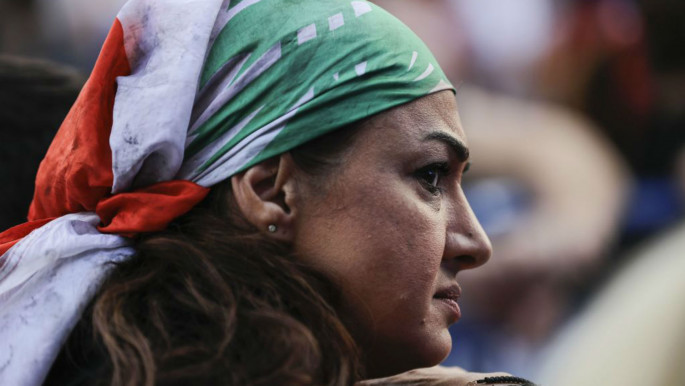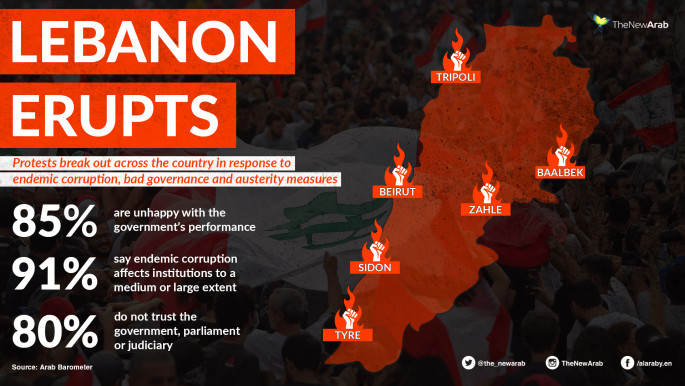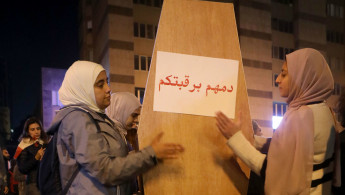Greater focus on mental health following multiple suicides in Lebanon
After several high-profile suicides in Lebanon since the start of December, there has been a greater focus on mental health in a country where the topic is a taboo.
Several men allegedly took their own lives due to the economic hardships that have continued to grow as Lebanon's economic crisis worsens.
The death of 40-year-old Naji Fliti, a man who committed suicide outside of his home when he could not pay the outstanding medical bills for his wife, and the case of one man attempting to self-immolate in Riad el-Solh during a protest garnered attention.
While the man survived due to bystanders putting out the flames, it drew greater attention to the issue of mental health in Lebanon despite the topic remaining a taboo.
"For most people, it's a stigma," clinical psychologist and physician Dr Maram Hakim explained.
"They will come here [to a therapist] only if nothing else works. They might go to the priest, to the sheikh, to the pharmacist, to the neighbour, to whoever to get some advice about mental health issues or medications related to mental health. And, then, if they face difficulty and it doesn't work, then they come to a doctor.
"That's a problem for the patient themselves because he's wasting his resources trying all of the different things. But the idea is that nobody should know that there's a mental problem."
According to Dr Hakim, suicide is an even greater taboo due to potential religious and social implications that it might bring depending on the family and religion.
"Suicide is even worse because it's more of a stigma than simple mental health... There's a lot of shame attached to it. Lots of shame within the family or the person themselves and they won't talk about it.
"But, then again, suicidal people won't talk frequently about it because they want to carry out the suicide, but, sometimes, some of them do talk. 'I wish that I were dead.' 'I wish I wasn't born.' 'I want to kill myself.' Suicide is one of the bigger taboos. It carries some shame with it for the family and there are some religious groups who won't bury the dead person."
 |
|
| Read also: Suicide epidemic sweeps Lebanon amid economic downturn |
Dr Hakim continues, "There's blame also. They kind of criminalise or blame the person who commits suicide for being, somehow, religiously a sinner or having broken some kind of commandment depending on what religion.
"But most of them are against suicide. So, the people around aren't only ashamed of it, but view it as a sign of weakness. They're also religiously infuriated that the person took his or her own life. So we have this kind of attitude that exists too. That adds insult to injury when it comes to people seeking help or talking about it or expressing themselves.
"Even the people around that person too. Let's say that someone carried out a suicide attempt or a completed suicide. The relatives and family won't even talk much about it because that's kind of shameful and whatever."
Statistically, between 80 and 90 percent of suicides occur because the individual had a pre-existing mental illness that ultimately led them to this point. However, this is not always the case.
"In the West or Lebanon or wherever, the 90 percent figure kind of sticks," Dr Hakim explained, "These are people who commit suicide because of mental illness, different kinds of mental illness, mostly depression. But the other 10 to 15 percent include people who are desperate, who are facing poverty or some terminal illness. And these people, the ones who recently committed suicide in Lebanon, are assumed to be people who were facing poverty in a very quick and sudden and sharp way."
 |
This drastic and continual shift is not lost on protesters like Caline Jiwan who views the crisis hitting Lebanon as a major reason for the deterioration in some people's mental health |  |
This drastic and continual shift is not lost on protesters like Caline Jiwan who views the crisis hitting Lebanon as a major reason for the deterioration in some people's mental health.
"Unfortunately, it's happening because the situation is very difficult," Jiwan stated.
"The middle class is disappearing, poverty is not only increasing, but is huge. It is comparable to some countries like Brazil and Mexico. Poverty in Lebanon was never that excessive and that hard. But, now, poverty means that we don't have enough to eat, to secure a dinner at home."
The slow disappearance of the middle class is something that Dr Hakim has also noticed.
"There's a big downturn in the economy as a whole," he said. "So, for some people who are on the edge of poverty, they're into poverty now. Those who were not on the edge of poverty are approaching the edge of poverty. So even for those who were middle class, things are getting worse now."
For Jiwan, poverty is a major factor that can have an extreme effect on someone's mental health.
"Losing jobs and not being able to medicate himself or even his family and kids," she said. "It's not an easy thing, but poverty, I think, is one of the biggest psychological effects on anxiety, suicide, depression, everything can easily come from poverty."
However, while poverty can be detrimental to someone's mental health, it can also depend on how long and how sudden the individual has been in a poor economic situation.
 |
|
| Read also: In Lebanon, revolution soothes a depressed nation |
"Generally, if you face a downfall financially or whatever," Dr Hakim explained, "That's something that may cause a quick depression or, for impulsive people, they won't even go through the stage of depression.
"They will just go from point A to point B, which is suicide because they feel totally helpless, hopeless, no light at the end of the tunnel and they give up and they just commit suicide. But, in most cases, if there is long term poverty, there might be grounds for becoming depressive when you see others living the good life and you're not able to reach or your kids aren't able to reach the same standard of living like the people around, then that may be grounds for some sort of long term depression. And with depression comes the increased risk of suicide."
When it comes to preventing future suicides, Dr Hakim says that the first solution would be to fix the economy so that no one will face a quick and sudden shift in their financial status. Besides that, he says that identifying people who are a high risk for suicide and getting them help.
"The second is for those that are at high risk to maybe start getting therapy or medication or both," he said.
"Even just prophylactically. It sounds bizarre, but that's one thing for us to do. To try to detect and encourage those that are at risk. Due to the economy and due to the stress and due to all of the upheaval, those who feel that their moods have shifted, their behaviour has changed in a negative direction, those people can be given some prophylactic therapy, counselling or even treatment whether its talk therapy, psychotherapy, any other kind of therapy or drug therapy."
This is exactly what organisations like Embrace are doing. The group holds multiple workshops on mental health throughout the country during the year and has had a lifeline that people who are having suicidal thoughts can call in to since 2017.
According to Embrace's Executive Director Lea Zeinoun, prior to December and the recent suicides, the lifeline would receive, on average, 150 calls each month. But since the suicides, the number of calls has skyrocketed.
"Usually, the lifeline will receive around 150 calls per month and around 260 whenever we were featured on the news, local news and social media," she said.
"But, definitely, as of December 4, we've had a huge surge in calls where we've reached over 200 calls a day and it's still ongoing."
 |
|
Zeinoun explained that this rise in calls was because "people started to talk about suicide, and they started to talk about Embrace" with Embrace's lifeline number quickly circulating social media.
"So, they started to call us and calls have just been steadily on that range of 100 to 200 calls a day," she stated. "So, we've kind of shifted our operations a little bit, hired more volunteers, trying to get another phone."
The news of Fliti's death, among others, is something that was deeply felt around the country with many people being outraged about how people are being pushed to this point.
"If you have any empathy, which is the case with the Lebanese culture, you cannot help but be affected by it [the suicides]," Jiwan stated sadly.
"It could be any one of us. Nobody knows how things will go. It's not only sad. I'm not happy seeing this is where we are reaching. That people are being pushed to reach that point where there is no hope. This is the worst thing."
Dr Hakim stressed that while it is important to seek professional help, if a family member appears to be suffering from depression or anything else that could have been caused by the tough economic situation, then it is extremely important for someone to talk to them.
"In our families, forget the professionals," he strenuously emphasised.
"If you have a family member who seems to be really suffering from all of this or you know that someone in the family has a very bad financial downturn, then someone should talk to them somehow in a delicate way and see whether they are having suicidal or depressive tendencies.
"Each family and each person has a way of being approached, but they do need to be approached."
Nicholas Frakes is a freelance journalist who reports from London, the Middle East and North Africa.
Follow him on Twitter: @nicfrakesjourno
Follow us on Twitter and Instagram to stay connected


![President Pezeshkian has denounced Israel's attacks on Lebanon [Getty]](/sites/default/files/styles/image_684x385/public/2173482924.jpeg?h=a5f2f23a&itok=q3evVtko)



 Follow the Middle East's top stories in English at The New Arab on Google News
Follow the Middle East's top stories in English at The New Arab on Google News


